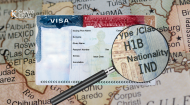In an exciting advancement, the United States Department of Homeland Security (DHS) has announced a series of innovations that will transform the Humanitarian Family Reunification Permit (FRP) processes for Cuban and Haitian citizens. These updates, which reflect key stakeholder feedback, will mark a milestone in the efficiency and accessibility of the process, providing families with the opportunity to reunite without the burden of travel, cumbersome procedures, and time loss.
A New Chapter in Family Reunification
In an effort to promote family unity and in line with the core values of the Declaration of Los Angeles on Migration and Protection, DHS is undertaking a radical modernization of the Cuban Family Reunification Permit (CFRP) and Haitian Family Reunification Permit (HFRP) processes. These processes, initially announced in April as part of a global strategy, are a testament to the ongoing commitment of the United States to security and legality in migration.
Secretary of Homeland Security Alejandro N. Mayorkas emphasizes the importance of legal pathways in managing immigration: "This modernization of family reunification permit processes enhances the integrity of our investigation and verification standards, responds to significant stakeholder feedback from both the Cuban and Haitian communities, and ensures meaningful access - consistent with our values - for potential beneficiaries."
The Future is Online
Starting from August 11, 2023, a significant portion of the FRP processes will be conducted online, greatly reducing the need for in-person procedures and streamlining the experience for applicants. Exceptions include undergoing a medical examination abroad by a designated physician and the in-person permit determination upon arrival at an interior U.S. entry port. This modernization is designed to leverage technological advances since the creation of CFRP in 2007 and HFRP in 2014, thereby enhancing efficiency and the overall experience.
A Focus on Identity and Security
Maintaining their commitment to process security and integrity, DHS will continue to conduct rigorous identity and eligibility verifications on a case-by-case basis, conducting robust multi-level security investigations. This ensures that potential beneficiaries are qualified and that families can reunite safely and orderly.
The Path to Family Reunification
The CFRP and HFRP processes commence with an invitation issued by the U.S. Department of State's National Visa Center to a U.S. citizen or lawful permanent resident whose Form I-130, Petition for Alien Relative, has been approved on behalf of a Cuban or Haitian beneficiary. From here, the FRP process begins with the submission of Form I-134A, an Online Application to Become a Supporting Individual and Financial Support Statement. This enables consideration for early travel authorization and entry permits for both the principal beneficiary and derived spouse and children.
Furthermore, DHS has expanded access to the HFRP process, now available to all approved principal Haitian beneficiaries, regardless of when USCIS approved Form I-130.
A Promising Future
This modernization of family reunification permit processes is a significant milestone in the United States' commitment to safe and orderly migration. By simplifying and streamlining the process, a secure and legal alternative to perilous journeys and maritime routes is offered. By providing a clear and efficient path to family reunification, DHS advances its goal of strengthening legal pathways and reducing irregular migration.
For detailed information on the application process and eligibility criteria, refer to notifications in the Federal Register for Cuba and Haiti.
This exciting announcement marks a significant milestone in the history of family reunification, reaffirming the United States' commitment to core values of security, legality, and family unity. With technological advancements and a security-focused approach, DHS is paving the way towards a more promising future for Cuban and Haitian families seeking reunification.
Remember that this blog provides general information and should not be considered legal advice. It's always advisable to consult an immigration lawyer or relevant authorities for specific guidance based on your unique circumstances.e blog proporciona información general y no debe considerarse asesoramiento legal. Siempre es recomendable consultar a un abogado de inmigración o a las autoridades pertinentes para obtener orientación específica basada en tus circunstancias únicas.






